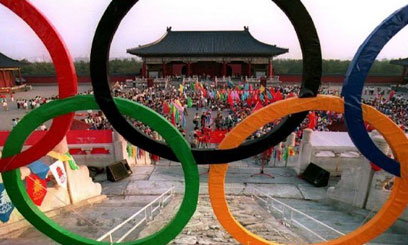“Last time we were the host nation, and this has given everyone interest in the Olympics,” he told AFP.
“Of course, people liked sport before we hosted the Olympics, but there wasn’t the level of interest that there is now. It is all because of what happened in 2008.”
A growing appetite for spectator sports, and pride in the successful hosting of the event four years ago are the enduring Olympic legacies for the people of Beijing as the London Games approaches.
China made an unmistakable impact as a sporting superpower at the Beijing 2008 Games – topping the medals table with 51 golds in the event which showcased the newly confident nation to the world.
Cynicism and grumbles over the massive cost of staging a Games, which have dogged most other host nations, are largely absent in China even though many of the 2008 Olympic venues are mired in debt, underused or even abandoned.
Beijing lacks the tangible buzz that gripped the city four years ago, but tourists visiting the iconic Bird’s Nest stadium were quietly looking forward to witnessing more sporting achievements from Chinese athletes in London.
Wu Qian, a researcher from China’s eastern province of Shandong who was touring the Olympic Park with her family, also praised the legacy that remains in the capital.
“I think the stadiums have been used really well. The Olympic Park has become a place for everyone to enjoy. London should learn from us,” she told AFP.
“Everyone is looking forward to the London Olympics,” she said. “I’m most looking forward to the diving, because China is good at it.”
However, 73-year-old garbage picker Tian Yonghai was less enthusiastic as he collected plastic bottles outside the spectacular venue, saying the 50 yuan ($7.80) entrance fee meant it was off limits.
“I think the price of tickets to tour the stadium is too high. This should be a place for low- and middle-income people,” he said.
The 370 million yuan ($59 million) revenue generated from tourism at the site is vital, and not just to pay for its maintenance fees which are estimated at about 80 million yuan a year.
The Bird’s Nest is also burdened with heavy debts from its whopping 3.6 billion yuan construction cost.
On Friday it will host a match between English Premier League clubs Arsenal and Manchester City but mass-spectator sporting events are still infrequent in China and most days the stadium sits empty.
The nearby Water Cube – where US swimming superstar Michael Phelps seized eight gold medals in 2008 – also funds its 1.3 billion yuan construction debts by enticing visitors.
The venue, with its distinctive bubbled exterior, is now a reasonably popular water park and swimming centre, but still lost an estimated 11 million yuan last year, according to media reports.
Beijing’s other Olympic venues have fared worse, particularly those built to cater for sports that are not popular in China.
The kayaking, rowing and BMX venues that are located in and around Beijing lie abandoned.
But for Ren Jingyu, who was visiting the Bird’s Nest as a tourist, it was impossible to put a price on the benefits of holding the Games.
“The Beijing Olympics were a good thing, they allowed China to show its development to the world,” said the tour guide from Sichuan province.
“I don’t think the money spent on the Olympics was wasted.”










































